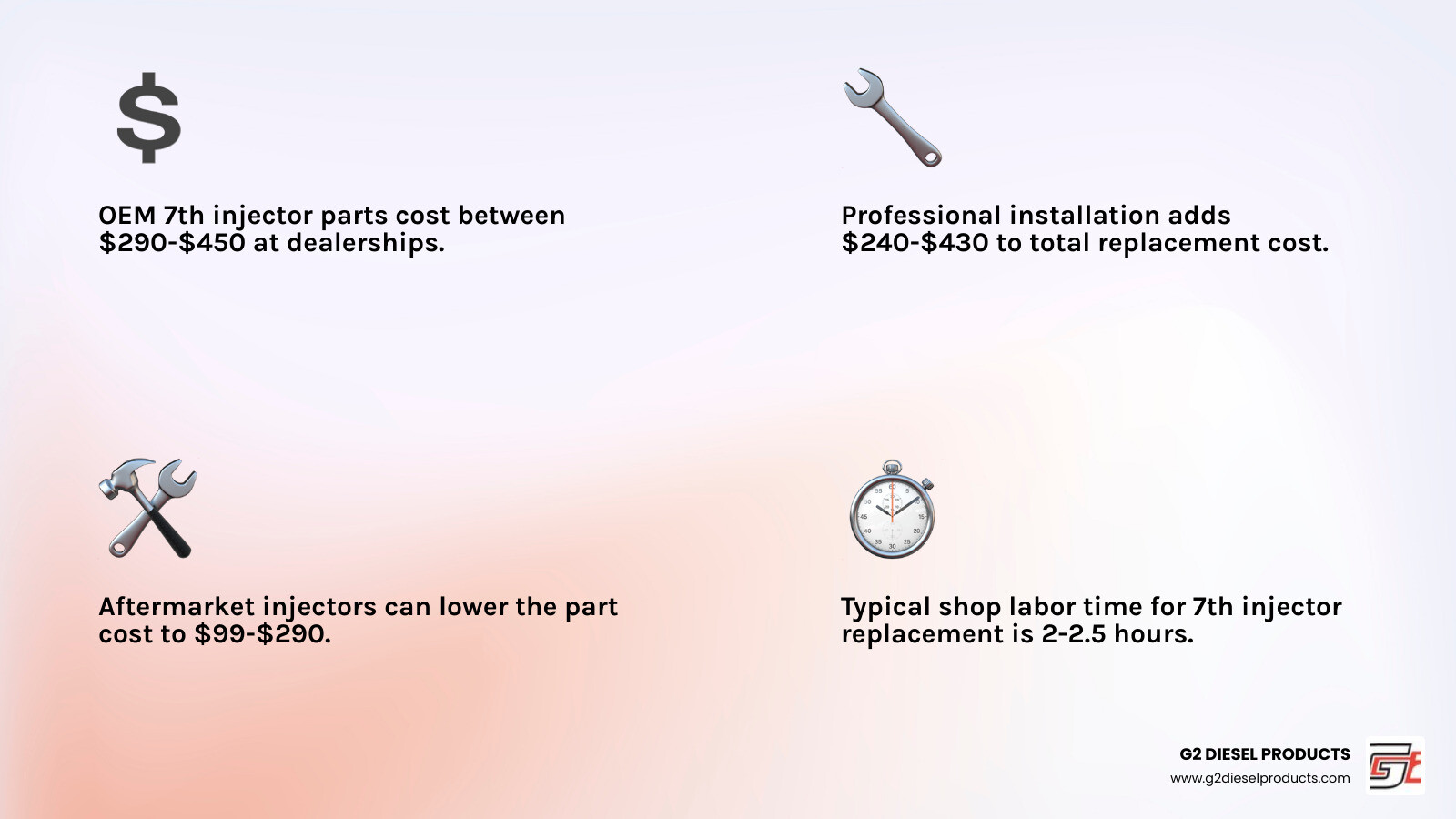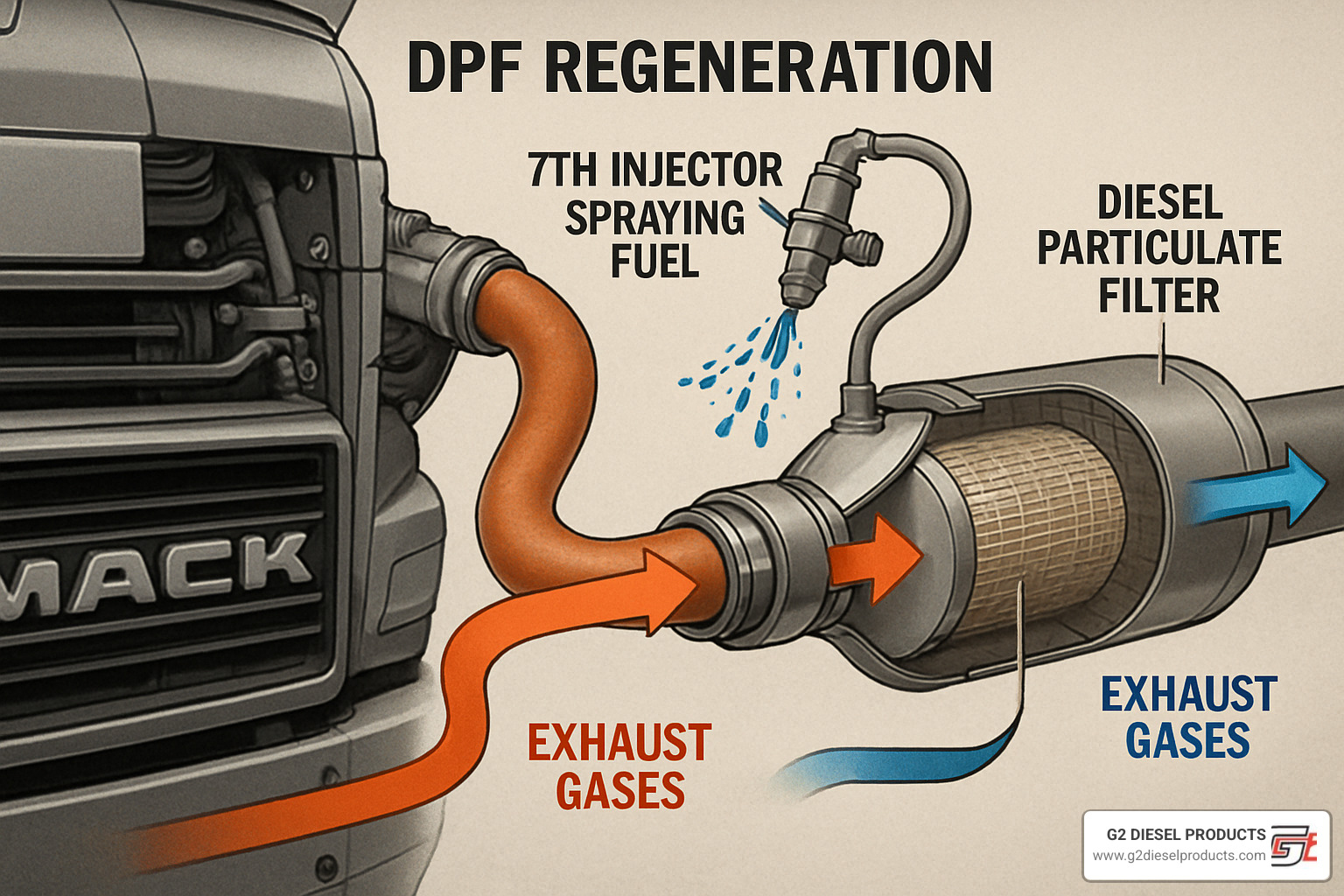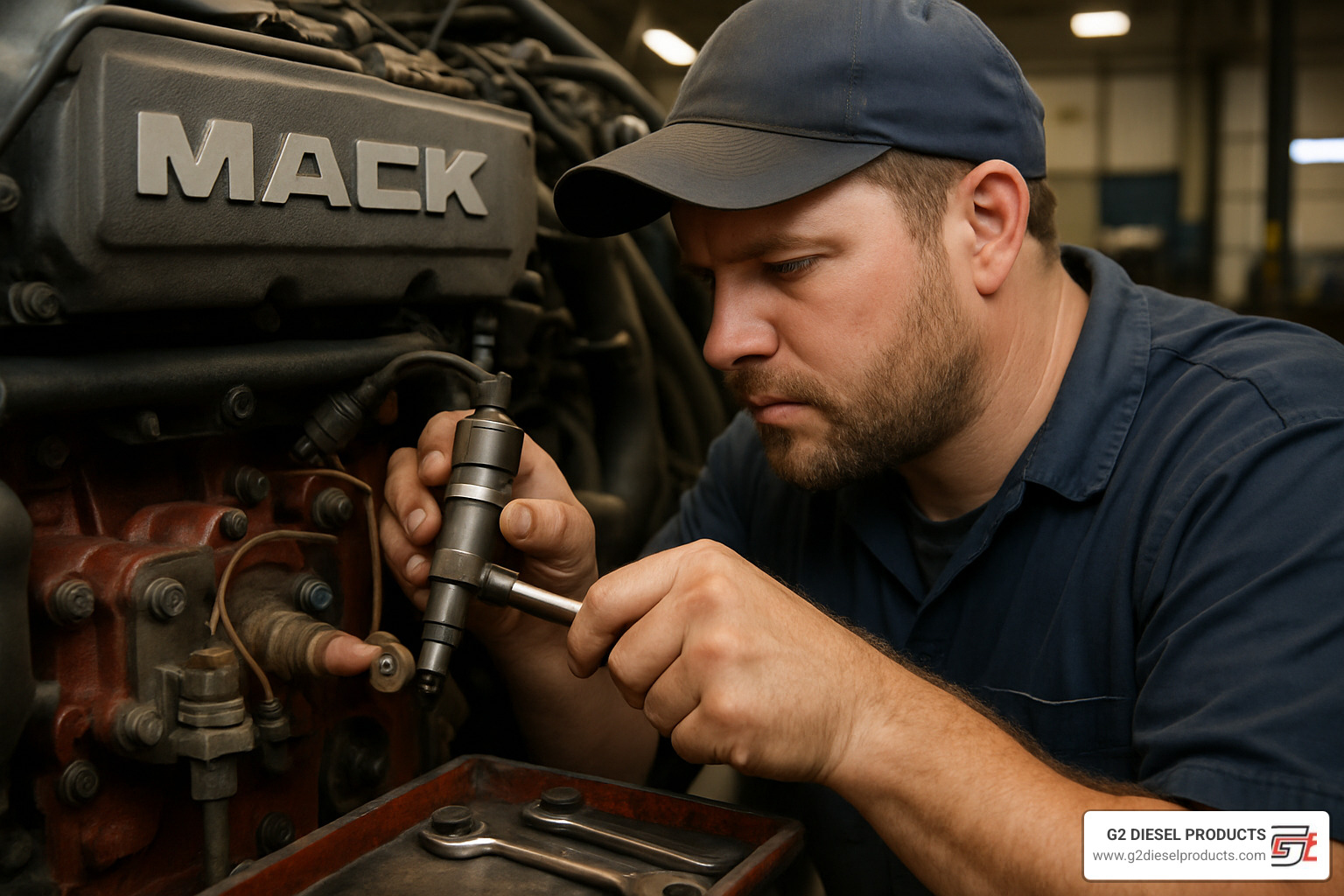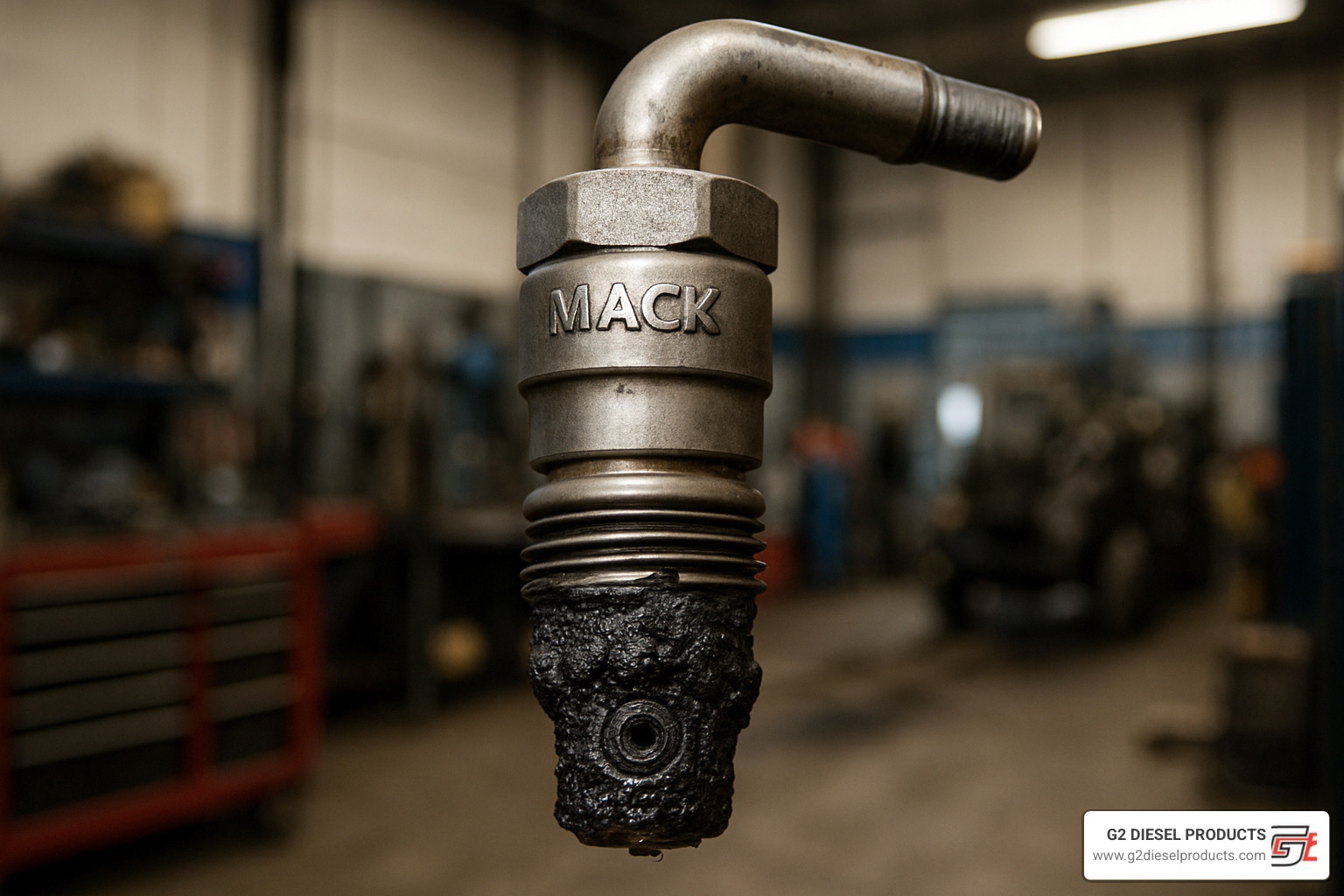How Much Will a 7th Injector for Your Mack Truck Set You Back?
Understanding the Cost of a 7th Injector for Your Mack Truck

If you're researching what does the 7th injector cost for a Mack truck, here's what you need to know:
| Cost Factor | Price Range | Notes |
|---|---|---|
| OEM Part | $290-$450 | Dealer pricing varies by location |
| Aftermarket Part | $99-$290 | Significant savings with comparable quality |
| Labor Costs | $240-$430 | Based on 2-2.5 hours at shop rates |
| DIY Installation | Parts cost only | Requires moderate technical skill |
When your Mack truck's exhaust after-treatment system isn't performing properly, the 7th injector (also called a fuel doser or hydrocarbon doser) might be the culprit. This critical component plays a vital role in your truck's emissions system, specifically in regenerating the Diesel Particulate Filter (DPF).
Unlike the six primary injectors that deliver fuel directly to your engine's cylinders, the 7th injector sprays fuel into the exhaust stream. This raises exhaust temperatures to burn off accumulated soot in the DPF during regeneration cycles.
For fleet managers and owner-operators, understanding the cost implications of replacing this component is essential for budget planning. The price varies significantly depending on whether you choose OEM or aftermarket parts, and whether you handle the installation yourself or pay for professional service.
The 7th injector is a common replacement item on Mack trucks with MP7 and MP8 engines (as well as Volvo D11 and D13 engines) from model years 2012-2017. Because it operates in the harsh environment of the exhaust system, it's exposed to extreme temperatures and corrosive conditions that can lead to eventual failure.
When budgeting for this repair, while the part itself is a significant expense, the total cost will depend on your choice of supplier, warranty needs, and installation approach.

7th Injector 101: Function, Engines, Part Numbers
Before diving into costs, it's important to understand exactly what the 7th injector is and why it's so crucial to your Mack truck's operation. This knowledge will help you make informed decisions about replacement options and potentially save you money in the long run.

How It Works in the After-Treatment System
Think of the 7th injector as the unsung hero of your truck's emissions system. Unlike its six siblings that feed fuel directly to your engine's hungry cylinders, this special injector (also called a hydrocarbon doser or HC-doser) works its magic in the exhaust stream.
When your DPF gets loaded with soot – which happens naturally during normal driving – your truck needs to clean itself through a process called regeneration. That's where our friend the 7th injector steps in. It sprays a fine mist of diesel fuel into the hot exhaust gases flowing toward the Diesel Oxidation Catalyst (DOC).
This fuel ignites in the DOC, cranking up the heat to over 1000°F – hot enough to turn that troublesome soot into harmless ash. It's like giving your exhaust system a controlled fever to burn away the bad stuff. Without this process working properly, you'd be facing poor performance, wasted fuel, and potentially a very expensive DPF replacement.
Which Mack & Volvo Engines Use It
If you're driving a Mack with an MP7 or MP8 engine from model years 2012-2017, you've got a 7th injector under the hood. The same goes for Volvo trucks running D11, D13, or D16 engines from the same era.
These engines are cousins in the same family, sharing similar emissions control systems. While newer models (2018 and beyond) still need to manage DPF regeneration, they might use updated designs or slightly different approaches.
It's worth noting that the truck world is evolving. Mack has been exploring alternative fuel options, as shown by the debut of the CNG-powered Mack® Granite® at the 2023 WasteExpo. These cleaner-burning trucks use different emissions strategies than traditional diesel engines.
Cross-Reference Part Numbers
When you're shopping for a replacement and wondering what does the 7th injector cost for a Mack truck, you'll need to know the right part numbers to compare apples to apples:
The main OEM part numbers to know are 21407621 (the original) and 22009269 (the updated supersession). Some parts catalogs might also reference 904-7915.
Dealers sometimes only recognize the newer number, while quality aftermarket suppliers like G2 Diesel Products typically list compatibility with both to make your search easier.
Most 7th injectors come as individual units with a new sealing gasket included. Better kits might also throw in mounting hardware like M6 x 15 screws. The injector itself usually has an M12 x 1.5 thread size – a detail that matters if you're doing the job yourself.
For a deeper dive into how these components fit into the bigger picture of your engine, check out the comprehensive resources on Diesel Engine Parts. Understanding what you're buying is the first step to making a smart purchase decision.
What does the 7th injector cost for a Mack truck?
Let's talk dollars and cents - the question that brought you here: what does the 7th injector cost for a Mack truck? The price tag swings quite a bit depending on a few key factors, especially whether you're going with factory parts or aftermarket alternatives.

OEM vs Aftermarket: What does the 7th injector cost for a Mack truck today?
When you're weighing your options, there's quite a difference between dealer and aftermarket pricing:
The dealer route means you're looking at the higher end of the price spectrum. Even with the typical dealer discount, you're still paying a premium for that OEM stamp. Factory parts usually come with a 1-year warranty, though this can vary depending on which dealer you visit.
On the flip side, aftermarket options offer some serious savings - we're talking about 50-70% less than what you'd pay at the dealer. Premium aftermarket parts sit in the middle price range, while standard aftermarket options hit the lower end. The best part? Many aftermarket manufacturers offer warranties ranging from 1-3 years, sometimes even better coverage than you'd get from the dealer.
Why such a big price difference? Most aftermarket manufacturers use similar materials and follow design specs close to OEM standards, but they can offer better pricing because they don't have the same overhead costs or complex distribution chains.
What's in the box matters too. Most 7th injectors come with a fresh sealing gasket (a must-have for proper installation). Some packages include the mounting screws, and premium kits might even throw in electrical connectors. Before purchasing, double-check what's included so you're not left scrambling for missing parts during installation.
If you've been battling ongoing issues with your Mack's injectors, you might want to check out our detailed guide on Mack Truck Injector Problems for some deeper insights.
Labor: What does the 7th injector cost for a Mack truck at the shop?
Parts are only half the equation - you've got to factor in the hands that'll be doing the work. Most shops estimate this job at about 2.0-2.5 hours of labor time. At today's rates, that means:
Independent repair shops typically charge on the lower to middle end of the hourly rate spectrum. Dealership service centers command premium rates, while mobile repair services vary widely (and often add travel fees to boot).
All told, you're looking at roughly $240-$430 just for labor, depending on where you're located and who's turning the wrenches. Shops in busy metro areas like our Harrisburg, PA neighborhood often charge different rates than those in rural areas.
The replacement job involves several steps: diagnosing the problem (usually through trouble codes), accessing the injector in the exhaust system, removing the old one, cleaning the mounting surface, installing the new injector with proper torque, reconnecting everything, clearing fault codes, and testing to make sure it's working properly.
Heads up - some shops might tack on additional diagnostic fees if the problem isn't crystal clear from the start. And if your DPF system has other issues or needs a forced regeneration after installation, that could mean extra labor charges too.
When planning your budget for this repair, investing in quality parts now can save you from repeat repairs down the road. A properly functioning 7th injector keeps your DPF system running efficiently, which means better fuel economy and fewer headaches in the long run.
Replacement Timing, Risks & Money-Saving Strategies
Let's talk about when that 7th injector might need replacing, what happens if you ignore the warning signs, and how to save some hard-earned cash without cutting corners.

How Often Should It Be Replaced?
Unlike your regular oil changes, the 7th injector doesn't come with a neat little sticker telling you when it's due for replacement. Most Mack trucks will see their 7th injector last somewhere between 300,000 and 400,000 miles before waving the white flag.
But your mileage may quite literally vary. Trucks that need frequent regeneration cycles are essentially working that injector overtime, potentially shortening its lifespan. Think of it like a sprinkler that's constantly running – it's bound to wear out faster.
Fuel quality plays a huge role too. That discount diesel might save pennies at the pump but could cost dollars in the shop if it's causing carbon buildup on your injector. And if you're hauling through dusty construction sites or along unpaved roads, your DPF is working harder, which means more regeneration cycles and more wear on your injector.
You'll know it's time for a replacement when your dashboard lights up like a Christmas tree with specific DPF-related codes, regeneration cycles start failing, or you notice excessive smoke during regen attempts. That distinctive "something's not right" exhaust smell during regeneration is another dead giveaway. And if your truck suddenly feels like it's pulling a second trailer when it isn't – that power derate is the emissions system waving red flags at you.
Can You Drive with a Bad 7th Injector?
Technically, yes. Practically, it's about as wise as ignoring a toothache before a cross-country road trip.
When that 7th injector fails, your truck's sophisticated emissions system notices immediately. Modern Mack trucks are programmed to protect themselves, which means they'll likely trigger an engine derate – essentially putting your 500-horsepower workhorse into pony mode. This isn't just annoying; it's a productivity killer when you're trying to make delivery deadlines.
Without proper regeneration, soot continues building up in your DPF like plaque in an artery. This creates back pressure in your exhaust system, forcing your engine to work harder and gulp down more fuel. Your MPG numbers will tank faster than you can say "fuel surcharge."
The real kicker? That DPF filter costs substantially more than a 7th injector to replace. What starts as a relatively minor repair can snowball into a major expense if ignored. It's like skipping a $30 oil change only to need a $3,000 engine rebuild later.
Most trucks will eventually enter "limp mode" with severely reduced power, making continued operation nearly impossible for commercial applications. At that point, you're not choosing whether to fix it – you're choosing between a tow truck or roadside service.
Ways to Cut Cost Without Cutting Corners
Smart truckers know there's a difference between being cheap and being frugal. Here's how to save money without compromising quality:
Quality aftermarket options can deliver performance comparable to OEM parts without the premium price tag. G2 Diesel Products specializes in manufacturing reliable aftermarket injectors designed to meet or exceed OEM specifications, giving you dealer-quality performance without dealer-quality pricing.
If you're handy with a wrench, DIY installation is completely doable for someone with moderate mechanical skills. The job typically takes 2-2.5 hours in a shop environment, but even if you take your time, you'll save considerably on labor costs. Just remember to work with a cool engine, disconnect the electrical connector first, and always use a new gasket when installing the replacement injector. Taking photos before disassembly can be a lifesaver when it comes time to put everything back together.
Don't overlook your roadside assistance benefits. Many trucking associations and insurance providers have negotiated discounted repair rates with service networks. A quick call might reveal coverage you didn't know you had for emissions-related repairs.
Ask about core credits when shopping for replacements. Many suppliers, including G2 Diesel Products, offer credits for returning your old injector, putting more money back in your pocket.
Finally, compare warranty terms carefully. A slightly more expensive injector with a 3-year warranty might actually be cheaper in the long run than a budget option with 6-month coverage if you plan to keep your truck for several years. Think of it as insurance for your investment.
For more detailed information about repair options, check out our resources on Diesel Injector Repair Kits and Diesel Injector Testing Services.
Frequently Asked Questions about Mack 7th Injectors

How long does swap time really take?
When shop manuals claim a 7th injector replacement takes 2.0-2.5 hours, many truck owners raise an eyebrow—and rightfully so. The real-world answer is (as with most repairs): it depends.
If you've got a seasoned tech who's changed dozens of these units, they might finish even quicker than book time. But throw in a few curveballs like corroded mounting bolts that snap off during removal (we've all been there), and suddenly you're looking at an afternoon project.
For DIY mechanics tackling this for the first time, budget 3-4 hours from start to finish. Much of this time isn't spent on the actual replacement but on proper preparation, careful cleaning of the mounting surface, and methodical reassembly. Remember the old mechanic's wisdom: rushing the job only means doing it twice.
Access varies significantly between truck configurations too. Some Mack models offer surprisingly good access to the doser location, while others seem designed to test your patience and flexibility. Your first replacement will always take longer, but the learning curve is worth it for the savings.
What comes in a typical replacement kit?
When you order a 7th injector, what does the 7th injector cost for a Mack truck usually include in the package? At minimum, you should receive the actual injector unit (the hydrocarbon doser) and a new mounting gasket—these are the bare essentials.
Better kits include the mounting hardware (typically M6 x 15 screws) which is always a nice touch since these fasteners often show signs of heat damage or corrosion after years of service. The highest quality offerings might also include thread sealant or anti-seize compound and detailed installation instructions with torque specifications.
The injector itself is more sophisticated than it might appear, housing a precision solenoid, carefully calibrated nozzle, and electrical connection point—all wrapped in a corrosion-resistant body with M12 x 1.5 threading. This precision engineering is why proper installation matters so much to longevity.
If you're dealing with electrical connector issues (fairly common after years of heat cycling), look for suppliers who offer replacement pigtails or connector repair options. These small extras can save you from improvising solutions in the middle of a repair.
Are aftermarket units reliable?
Let's address the elephant in the room—many truck owners worry that saving money on aftermarket parts means sacrificing reliability. I completely understand the concern. When you're looking at potential downtime that could cost thousands in lost revenue, saving a couple hundred dollars suddenly doesn't seem so smart.
The truth is more nuanced, though. Quality aftermarket units from reputable manufacturers can deliver performance identical to OEM parts. The key word here is quality.
What separates the good from the questionable? Look for manufacturers who proudly share their quality control processes. ISO certification is a good start. Ask about their testing protocols—pressure testing and functional verification should be standard. And pay close attention to warranty terms—companies confident in their product typically back it with solid coverage.
At G2 Diesel Products, we've built our reputation on manufacturing aftermarket injectors that meet or exceed OEM specifications. Our testing processes ensure each unit performs reliably in the punishing environment of exhaust systems. We're based in Harrisburg, PA, which allows us to ship quickly throughout the Eastern United States—because we understand that every day your truck sits idle costs you money.
Many of our long-term customers report that our aftermarket injectors perform identically to OEM parts they've used previously—just without the premium price tag. When properly installed, a quality aftermarket 7th injector should give you hundreds of thousands of trouble-free miles.
For more comprehensive information about injector options, you can check out our shop-Volvo-Mack injectors page for specific models and compatibility.
Conclusion
When you're trying to figure out what does the 7th injector cost for a Mack truck, it's a bit like shopping for tires - prices swing widely depending on whether you go OEM or aftermarket, and whether you're rolling up your sleeves or paying a pro to handle it. While the price tag might make you wince initially, addressing these issues promptly can save you from the much bigger headache of major DPF system repairs down the road.
Let's take a moment to reflect on what we've covered:
Your truck's 7th injector isn't just another part - it's the unsung hero of your emissions system, spraying fuel into the exhaust during regeneration to keep your DPF clean and your truck running strong. When it fails, your wallet feels it, but there are ways to soften the blow.
The warning signs aren't subtle - regeneration problems, sudden power loss, and those pesky fault codes lighting up your dash. Your truck might still roll with a bad injector, but it's like driving with one foot on the brake - you're just asking for bigger troubles and potentially stranding yourself roadside at the worst possible moment.
Smart operators know that saving money doesn't mean cutting corners. Quality aftermarket parts can deliver OEM performance without the premium price tag. If you're handy with tools, DIY installation can slash labor costs, and don't forget to explore warranty options that protect your investment.
At G2 Diesel Products, we've walked in your boots. We know the pressure of downtime and the sting of unexpected repairs. That's why we've focused on creating high-quality 7th injectors that match or exceed OEM specs, but at prices that won't force you to choose between fixing your truck and making your mortgage payment. Our Harrisburg location means fast shipping across the Eastern US, getting you back on the road where you belong.
Maintaining your emissions system isn't just about keeping inspectors happy - it's about preserving the performance, efficiency, and lifespan of your Mack truck. After all, that truck isn't just a vehicle; it's your livelihood.
For a closer look at our full range of quality injectors for your Volvo or Mack truck, check out our shop for Volvo-Mack injectors.
